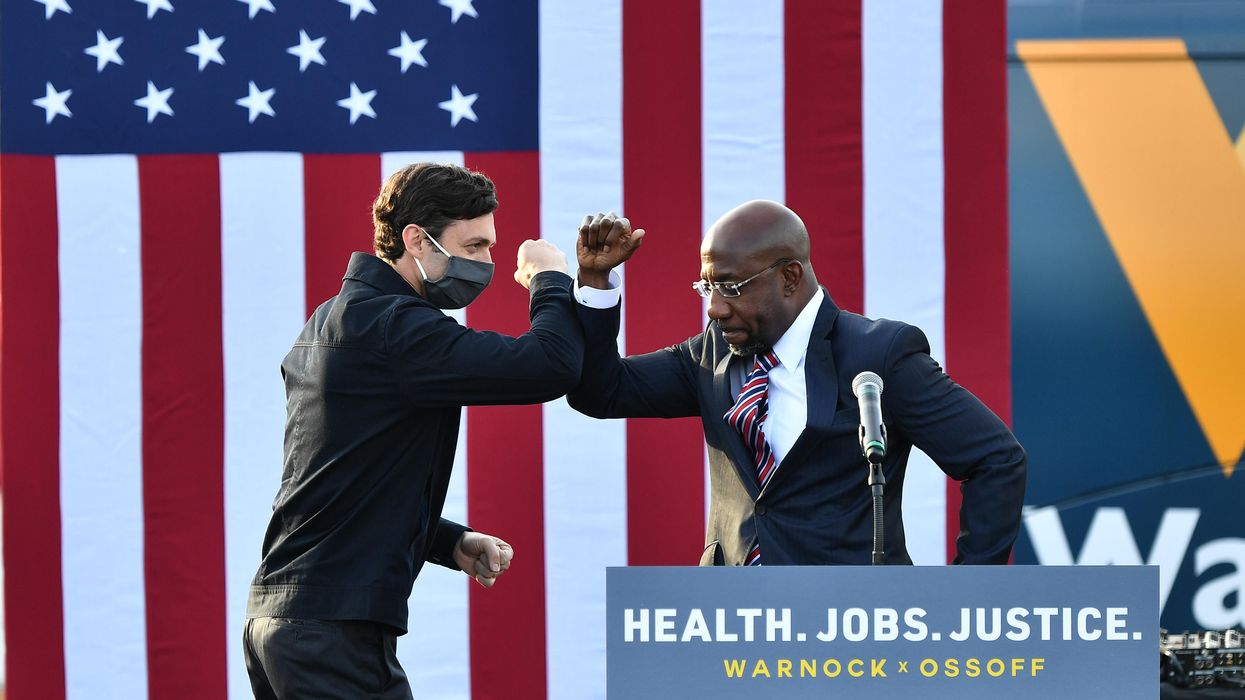The Senate election results in Georgia have Democrats dancing in the streets and democracy advocates cheering another seemingly successful high stress election. Turnout was extraordinary for a runoff, election officials performed efficiently, and fears of conflict and voter intimidation proved unfounded.
But there could be trouble ahead. Jon Ossoff and Raphael Warnock will not officially become senators, and cannot swing control of Congress to their party, until they are seated by the Senate. That normally mechanical procedure could become the next round in our never-ending partisan dogfight.
If either Republican candidate contests the results — as President Trump and his allies will surely insist — it will not be Georgia's stalwart secretary of state, Brad Raffensperger, with the last word on who won. Nor will it be the Georgia Supreme Court, or even the U.S. Supreme Court.
The "Judge of the election of ... members" of the Senate, according to the Constitution, is the Senate itself.
For the vast majority of elections to both the House and Senate, this quirk — let's be more honest, this flaw — in our founding document does not pose a problem. Normally, with losers having conceded, the House and Senate dispense with a vote and permit the state-certified winners to take their seats.
But little else has happened normally this year, and with control of the Senate in the balance and Mitch McConnell still in charge, we should not be surprised if another challenge to our democracy is ahead.
McConnell did try to protect the Electoral College count from objections, but he did so less on principle than to avoid politically difficult votes for his caucus. At least for the election between Ossoff and David Perdue, the closer of the two on Tuesday, there are certain to be GOP claims asserting Perdue's victory. McConnell will be tempted to call for the Senate to investigate before seating a winner — which would mean depriving himself of the gavel.
In a parallel situation from 23 years ago, the GOP-controlled Senate seated the state-certified winner in Louisiana, Democrat Mary Landrieu, even as an investigation dragged on for months before affirming her 5,000-vote victory. By that precedent, McConnell should arrange for a vote to seat Ossoff and Warnock as soon as their victories are certified.
Maybe the terrible events at the Capitol on Wednesday will bring a stop to such brinkmanship, but it should not be surprising if McConnell again ignores a precedent that interferes with his exercise of power.
Adding to the complexity are at least two contested elections where legislative bodies are playing a role. In Pennsylvania, the GOP-controlled General Assembly is refusing to seat the state-certified Democratic winner of a close state Senate election until a legal challenge is completed.
In the House, Speaker Nancy Pelosi has agreed that the House Administration Committee will investigate the claims of Democrat Rita Hart, who is asking the House to use its constitutional prerogative to overturn her loss in Iowa's 2nd District. Pending the outcome, the House has seated her Republican opponent, Mariannette Miller-Meeks, certified by the state as the winner by a scant 6 votes.
The most legendarily bitter incident of the House using this power was 35 years ago. The Democratic majority voted to seat one of their own, Frank McCloskey of Indiana, after the state certified the winner as Republican challenger Richard McIntyre. Selective acceptance of evidence by the majority-run panel that investigated the dispute produced a four-vote McCloskey margin and led to a Republican walkout in protest. Subsequent investigations by journalists made clear McCloskey should not have been declared the winner.
Pelosi should take steps to avoid that kind of outcome in the Iowa contest — and to set a model for any Senate investigation of the Georgia elections. The House Administration Committee has seven Democrats and three Republicans, so Pelosi should see to it that a subcommittee with equal representation of both parties is given charge of the investigation. If the panel deadlocks, the victory for Republican Miller-Meeks as certified by the state should remain in force.
Doing so would put pressure on McConnell to conduct any Senate investigation in a similar bipartisan manner. And the Senate should follow both its own precedent and the House's approach to Miller-Meeks and promptly seat the state-certified winners from Georgia pending any investigation.
More broadly, there are lessons here from the fact that our Founders gave Congress judgment over the election of its own members. Writers of a constitution today would not take that path because of the clear conflict of interest and risk of abuse by the party with legislative control.
At the beginning of the world's long democracy learning curve, the Founders naively believed parties could be kept out of governing institutions, and they failed to anticipate how a political party could use this and other ways of controlling elections to keep itself in power.
France provides an instructive comparison. Its earlier constitutions followed the American example and gave its legislature the right to judge elections, which led to abuses. France's current Constitution, ratified in 1958, ended that practice and established a Constitutional Court as the definitive source of judgment on all national elections.
Our courts have moved over time to something of a similar role, but inconsistently and incompletely. Here as elsewhere our antiquated system is very vulnerable to the partisan will to hold power. That leaves us to hope that Senate Republicans improve on their track record and do the right thing.




















Trump & Hegseth gave Mark Kelly a huge 2028 gift